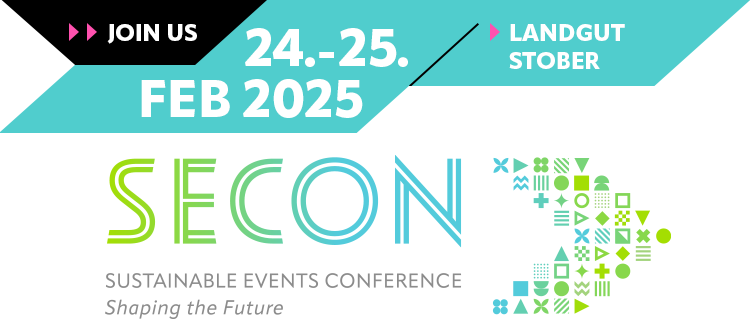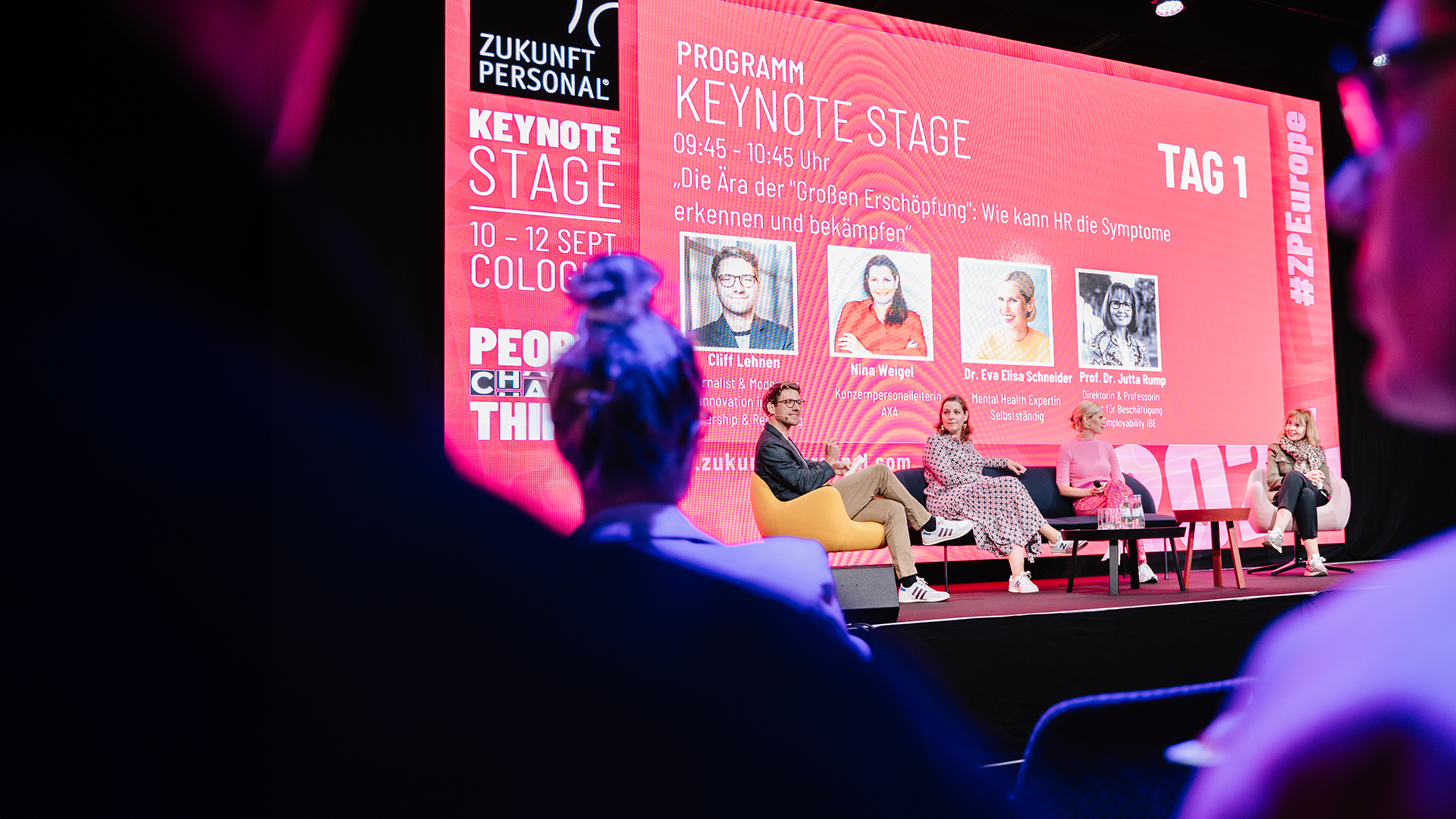
Mental Health
Stay healthy together
"The era of great exhaustion" - that was the title of the opening discussion at the HR trade fair Zukunft Personal Europe on 9 September 2024 at the Cologne Exhibition Centre. Photo: ZP Europe
"The era of great exhaustion" was the title of the opening discussion at the HR trade fair Zukunft Personal Europe on 9 September 2024 at the Cologne Exhibition Centre. Photo: ZP Europe
With crises, war and increasingly complex tasks, more and more people are feeling exhausted. This also applies to event professionals and trade fair organisers, who are always under a lot of stress at times. Does this mean that they are more at risk than other professional groups?
"The era of great exhaustion" is the title of the opening discussion at the ZP Europe HR trade fair on 9 September 2024 at the Cologne Exhibition Centre. A few weeks later, Fréderic Letzner will address the topic of "Mental health in hectic times" in the closing keynote speech at the EVVC symposium. At the beginning of November, the Hospitality HR Summit will focus on the responsibility of employers to create healthy working environments. As well as Nextlive.festival in November will also focus on how to stay healthy at work: Sven Kretzschmar, Head of Brand Management for Germany and Austria at Hipp, will be on stage, among others, to share how he personally experienced burnout—and found his way out.
Mental health is currently a hot topic for HR managers inside and outside the trade fair and event industry. And there are good reasons for this. "We see a lot of exhaustion among our employees," says Nina Weigel on the ZP Europe stage, which she shares with ergonomist Jutta Rump and mental health expert Eva Elisa Schneider. Weigel is Head of Human Resources at the AXA Group and is very concerned about her observations, which coincide with the findings of the McKinsey Health Institute: according to a recent study, 37 per cent of all employees in Germany complain of physical and mental exhaustion, while only 51 per cent of those surveyed feel healthy and relaxed. "Mental health is no longer just a personal issue, but a business-critical one for many companies," explains Weigel.
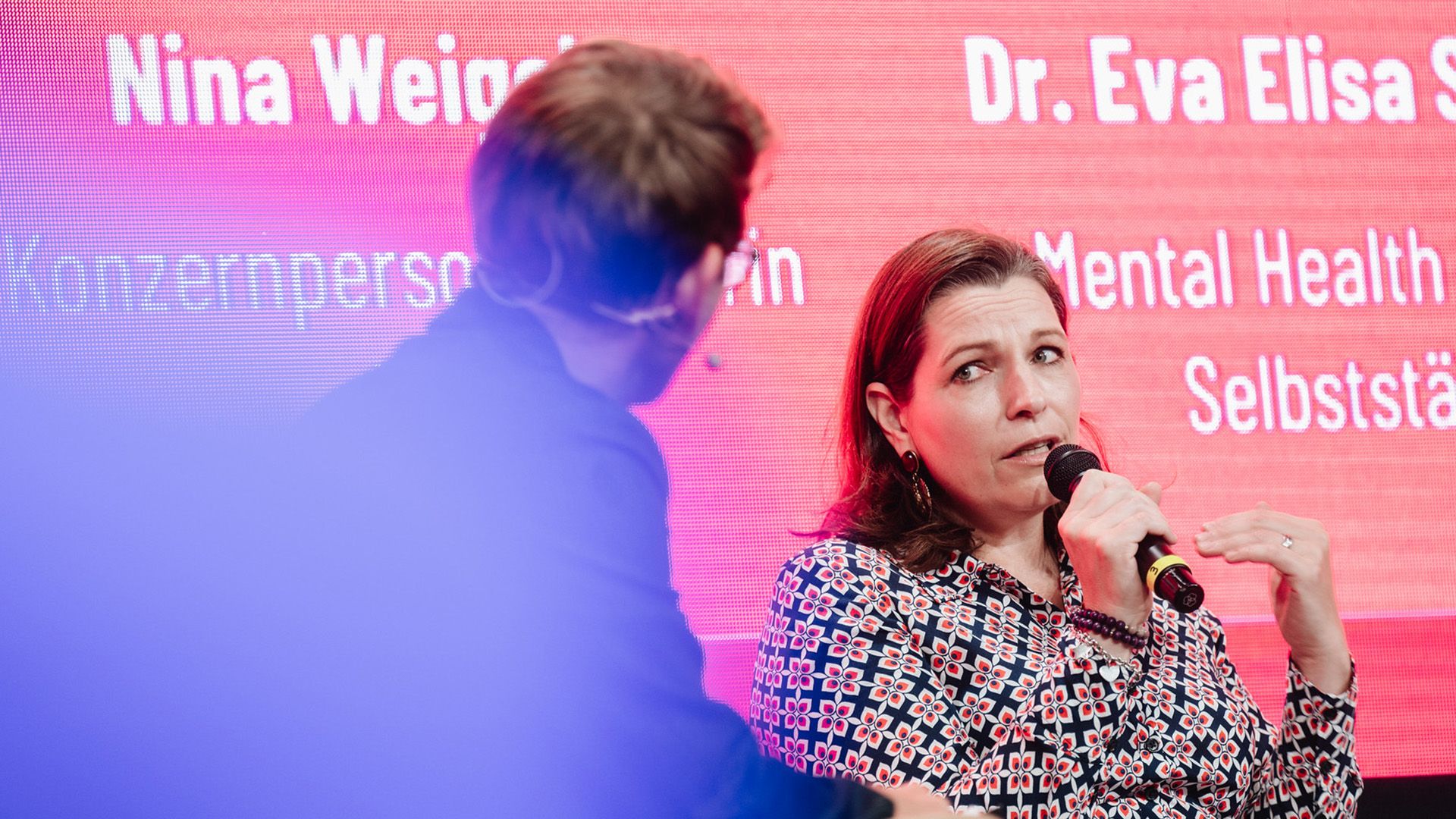
Nina Weigel, Head of Human Resources AXA Group, at the discussion on the first day of the ZP Europe HR fair. Photo: ZP Europe
In fact, mental illness has been one of the most common causes of incapacity to work for several years - and is therefore a direct burden on companies. Most recently, the AOK's absenteeism report, which the health insurance association presented at the beginning of October 2024, found that the corresponding days lost have increased by almost 47 per cent since 2014. The increase in burnout-related incapacity to work was even higher: ten years ago, there was one day of sick leave per AOK member; by August 2024, this figure had risen to 1.8 days. Other health insurance companies report similar developments.
How stressful is the event industry?
The insights and data span across various industries; unfortunately, there are no specific figures for the trade fair and event industry. According to the European Association of Event Centres (EVVC), it is also difficult to make an assessment of specific stress levels - the company models, workloads and personnel situations in the industry are too diverse. "And the venues that we represent are also set up so differently that the personal workload of employees varies greatly," explains EVVC Managing Director René Tumler. However, the majority feels the effects of recent developments identified by the health insurance companies. : Especially the shortage of skilled labour adds to the problem. "Due to tight staffing situations, employees feel they have to work more and harder." Tumler phrases cautiously, while emphasizing: "However, this does not necessarily equate to mental stress."
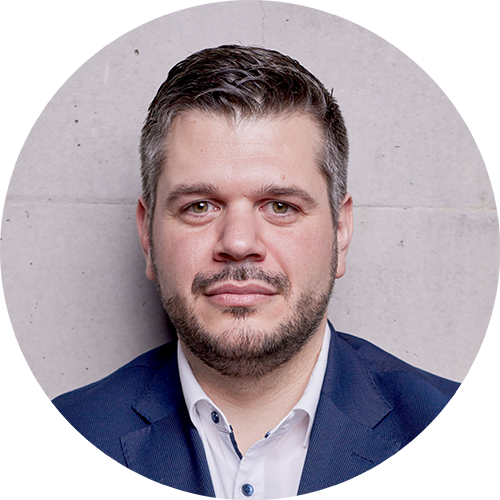
Photo: Christof Mattes
"A higher workload does not necessarily equate to mental strain."
René Tumler, Managing Director of the European Association of Event Centres (EVVC)
Leo Nitzberg, co-founder of the American event agency VADA, describes specific stress factors in September 2024 on LinkedIn, which he recognises for himself and for people in event planning in general: "The stakes are often high, as considerable financial investment often depends on the success of an event, as well as high customer expectations, safety standards and public attention." The pressure is therefore great. Tight timeframes, unforeseen changes, difficult negotiations and irregular, often long working hours are often an additional burden, says Nitzberg.
Stress alone does not make you ill
However, even these factors are not an automatic reason for exhaustion, emphasises mental health expert Neşe Oktay-Gür. This is because we usually know when a hot phase is coming - and adjust to the stress. "And we are psychologically very well equipped to cope with such occasional stress," explains the psychologist, who has also supported event agencies in developing a healthy work culture with her consultancy firm NAP! It is crucial that there is a prospect of recovery after the stress. In quieter phases, the batteries can then be recharged, says Oktay-Gür: "Then we pay back our mental health debt, so to speak."
"This recovery can look very different for each person—and often, small moments of calm in a hectic day are enough. 'You don’t necessarily need a day at the spa—there’s already a difference if you take mindful moments to enjoy your favorite tea or keep up with your exercise routine, even when things get stressful,' says Oktay-Gür.
Balance is important to allow the stress hormone cortisol to be broken down periodically. While cortisol can temporarily enhance performance by raising blood pressure, boosting the immune system, and reducing inflammation, chronic stress leads to insomnia, inner restlessness, and exhaustion.
Many companies are aware of this and offer opportunities for balance. For example, Deutsche Messe AG provides the 'Fair Balance' program for employee health, offering fitness courses and massage appointments. NürnbergMesse also offers year-round health, movement, nutrition, and mental health programs, including 'Active Breaks' and a six-week well-being program. And at Koelnmesse, in addition to health courses, resilience training and burnout prevention measures, there is also an in-house running group and an in-house football team, for example, where sport is combined with fun. "Our aim is to create an attractive, stress-free working environment that holistically promotes the mental and physical health of our employees," states the press office.
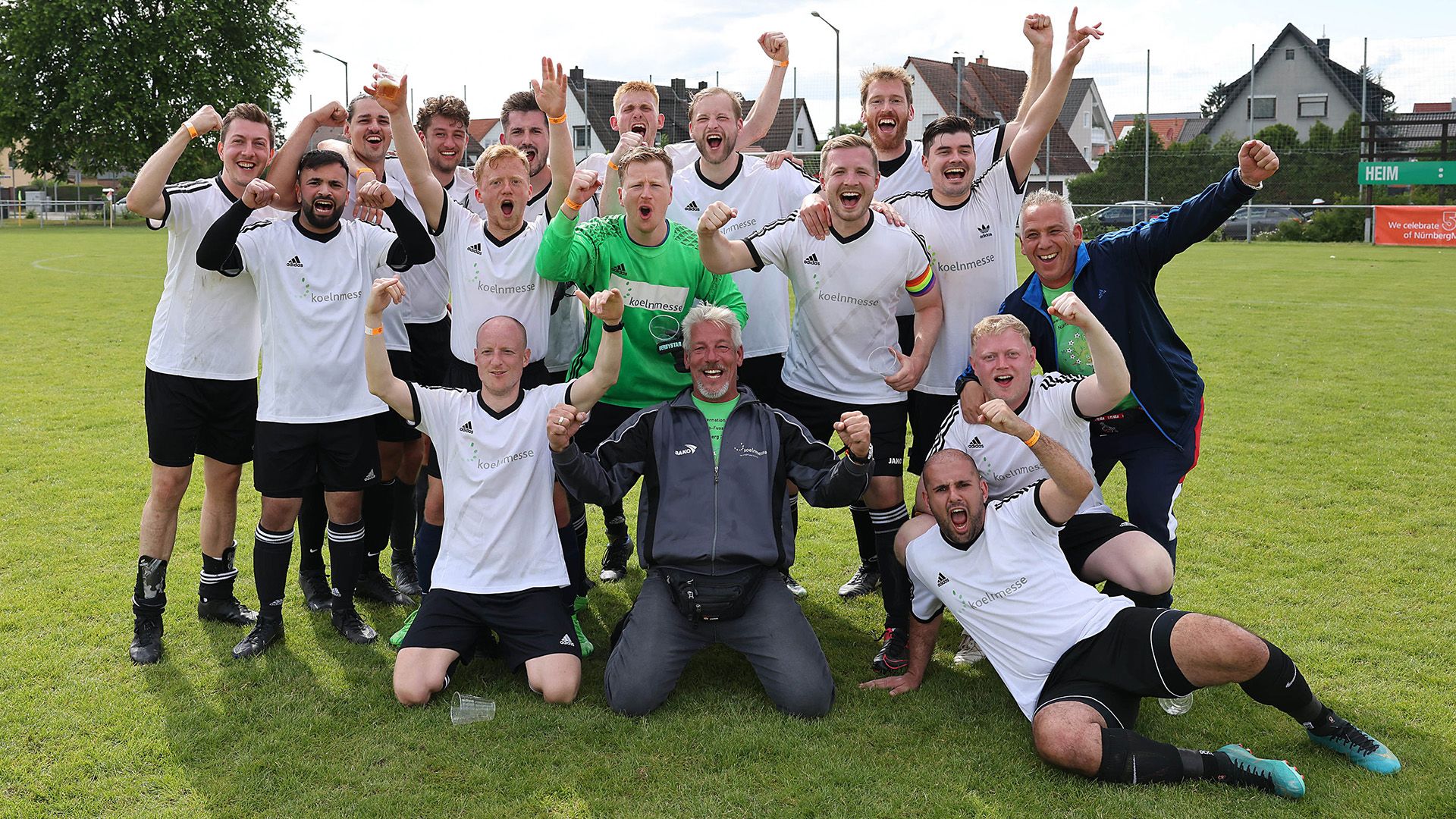
Koelnmesse's football team provides recreational sport and is also intended to train team spirit. Photo: Koelnmesse
Of course, this does not mean that sport activities are enough to completely avoid exhaustion. Working from home and flexible working time arrangements, which almost all companies in the congress and trade fair industry offer to make it easier for their employees to maintain a healthy work-life balance, also make an important contribution. And the EVVC believes that even more could be done in this field, as the workload often fluctuates extremely throughout the year, especially in the congress industry. "With appropriate legal adjustments, many innovative concepts such as a four-day week or longer periods of time off could be implemented to counteract this risk," says Managing Director Tumler. This would allow employees to reduce overtime more quickly after phases in which increased presence is required.
The responsibility of managers
Working from home, on the other hand, is a double-edged sword, as working from home exacerbates the dissolution of work boundaries and constant availability. However, the editors of the AOK Absenteeism Report recognise both as an important reason for days lost due to mental health issues. They therefore also believe that companies have a responsibility to strengthen the leadership skills of their managers in this regard. Sven Kretzschmar, who talks about his own burnout at the Nextlive.festival, takes a similar view. For the top manager, prevention includes not only balancing out with sport or socialising, but also not reading or writing any more messages in the evening: "And for us as managers, that also means sticking to these times in our communication!" For mental health expert Oktay-Gür, this is exemplary behaviour. She advises managers not to always be available themselves and, above all, not to send orders and enquiries at inappropriate times. "And if someone absolutely has to do this to get something off their mind, they should say so," advises the doctor of psychology. For her, this means that a manager - e.g. by default in their signature - explicitly points out that they do not expect an immediate response. "For example: I like to get things done in the evening, but that doesn't mean I expect you to do the same," she suggests. And if something is really urgent, you should communicate this just as explicitly, says Oktay-Gür. In this way, a lot of pressure can be relieved in everyday life and teams can organise themselves better - and also better accommodate their own time off. Above all, they can then more easily justify to themselves that they are allowed to take this time off. Because not everyone is good at that. "Many people have irrational beliefs - for example, that they don't deserve a break or that they have to do everything perfectly," warns Okay-Gür. This is where the company health management programme at Messe Nürnberg comes in, which is currently offering a workshop on "Beliefs and inner drivers". After all, such drivers, together with other stress factors, can quickly lead to excessive demands and perhaps even burnout: The first step towards burnout is often the feeling of having to prove oneself at all costs - which can easily arise from excessive ambitions as well as personal insecurities.
Be alert for warning signals
Sven Kretzschmar is very familiar with excessive ambitions. He has experienced it himself and knows how easy it is to exceed your own limits in a job that you love and are good at. "Even when I couldn't sleep anymore, I kept going," explains the Hipp manager. After all, everything was so important and he was indispensable, he remembers. Today he realises that this was his biggest mistake: "If I had reacted earlier, I could have spared myself and my family many painful experiences."

Photo by Tatjana Lee
"If I had recognised the warning signs earlier, I could have spared myself and my family many painful experiences."
Sven Kretzschmar, Head of Brand Management at Hipp for Germany and Austria
According to Kretzschmar, warning signs that stressed individuals should watch for include the compulsion to prove themselves, increased ambition, and the subtle neglect of their own needs. This often leads to conflicts, which are also suppressed. As the Hipp manager explains, he gave up more and more—food, sleep, the sacred Monday table tennis, and time with friends and family—and found less and less understanding from those around him. At the same time, despite his high level of commitment, he became increasingly unproductive, no longer met deadlines and made more mistakes. "‘At this point, all alarm bells should go off for supervisors,’ emphasizes Kretzschmar, who himself leads a large team. If people then become more closed off or sarcastic, stop smiling, or constantly look tired, it’s time to talk to them, sort tasks, and set priorities. However, René Tumler from the EVVC believes this should happen even earlier. He advocates for regular discussions with employees about their current workload: ‘Addressing mental load can also be helpful.’ For him, communication is key to creating a health-promoting work environment."
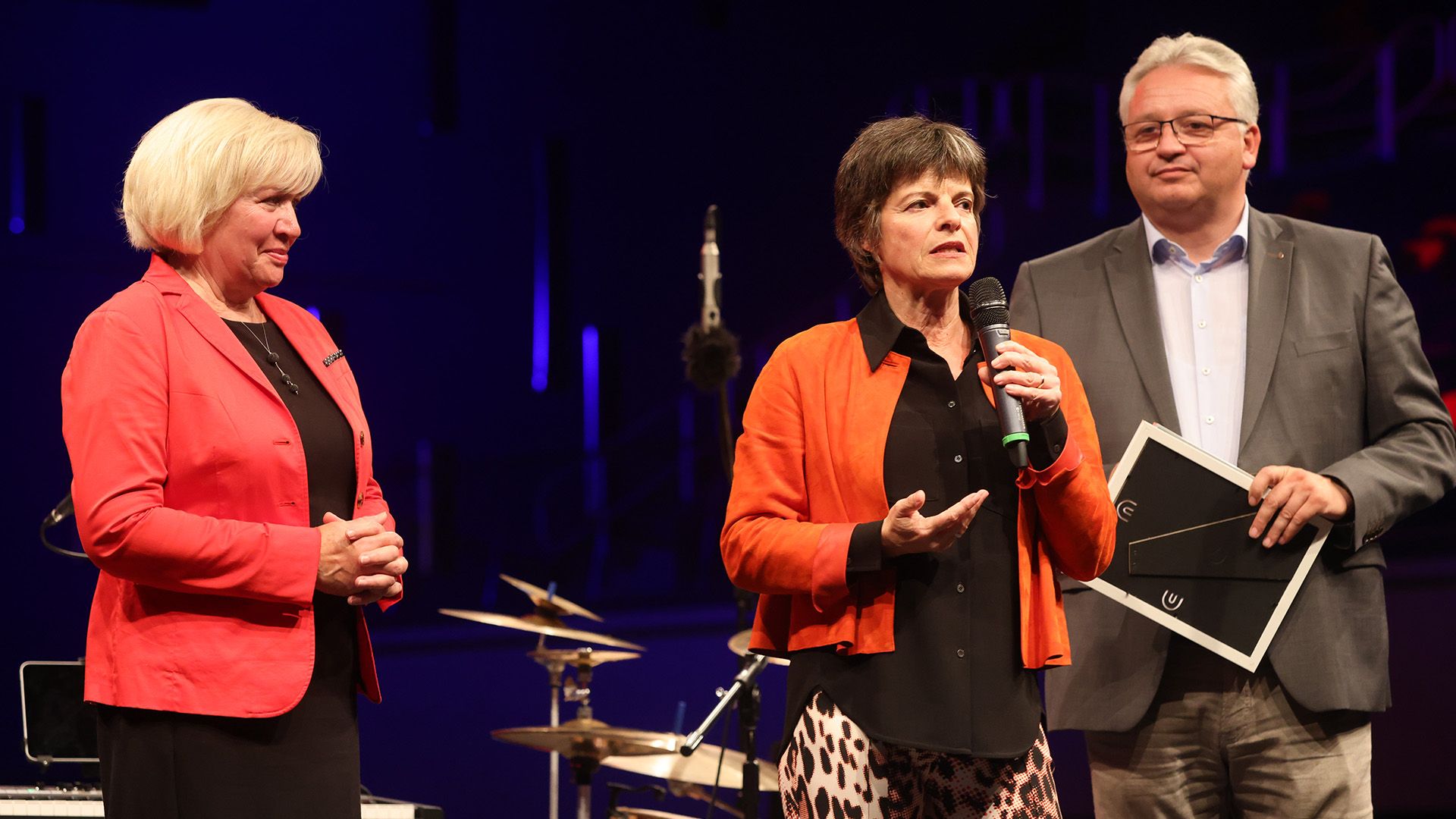
Raising awareness of the topic of mental health was on the programme of the EVVC Conference 2024 - here the hosts at the evening event - from left to right: Petra Burmeister, Managing Director of Rostock GmbH, EVVC President Ilona Jarabek and Vice President Stephan Lemke. Photo: Danny Gohlke
However, if managers keep a close eye on things, communication is good and people feel they can point out stresses and strains, then even pronounced periods of stress can be managed well together. "The desire to achieve something is also very satisfying," emphasises AXA HR manager Weigel, who is responsible for over 8,000 employees in Germany. In addition to prevention and early detection, Weigel is therefore particularly keen to create the best possible framework for employees. "Then work is not just one of many stressors, but above all a valuable resource," believes the HR Director. And that certainly doesn't just apply to the insurance industry. After all, organising trade fairs and congresses in particular not only presents many challenges, but is also full of rewarding moments. Event planner Leo Nitzberg certainly sees it that way: "Producing events is undoubtedly a strenuous job, but it is also incredibly fulfilling."
Sylvia Lipkowski

